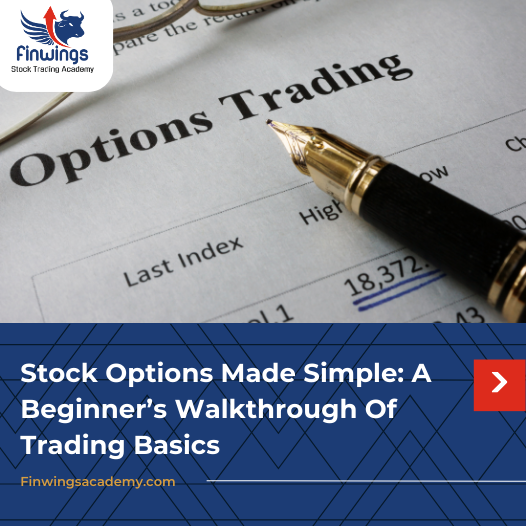Stock Options Made Simple: A Beginner’s Walkthrough Of Trading Basics
Purchasing and selling option contracts is a part of stock options trading. These contracts, which are linked to an underlying asset, give investors the option to trade a specific volume of that asset on a specific date at a specific price. The amount you pay up front for any stock option is called the premium, and the pre-negotiated price is known as the strike/exercise price. Moreover, the expiration/maturity date is the prearranged deadline, if any, by which you can trade these assets. The best thing about trading stock options is that it does not need you to make forced purchases or sales of assets. Rather, it grants you the “right” to trade contracts for stock options. Doing trading in options is extremely risky and can wipe off your entire capital if done without knowledge. So, it is always advisable to go through a stock market course in Ahmedabad before you begin trading in options.
Types of Options
There are basically two types of options which are taught in detail in a good share market training in Ahmedabad and we will discuss them in brief below.
Call option
The right, but not the responsibility, to purchase the underlying securities at the strike price on or before expiration is granted to the holder of a call option. As a result, a call option will rise in value in tandem with the price of the underlying securities (calls have a positive delta). Since a long call has limitless upside potential and the maximum loss is equal to the option’s premium, it can be used to speculate on the underlying price rising.
Put Option
Put options, in contrast to call options, allow the holder the option, but not the obligation of having to sell the underlying stock at the strike price on or before the option’s expiration. Because the option gains value when the price of the underlying asset declines (they have a negative delta), a long put is essentially a short position in the underlying security. As a kind of insurance, investors can purchase protective puts, which give them a price floor on which to hedge their positions.
Benefits of options trading
Even though trading stock options is a little more complicated than trading stocks, you can lock in larger returns in the event that the asset price increases. This is due to the fact that an options contract does not require you to pay the full purchase price of the shares.
Comparably, if the stock price swings against your expectations for a put or call, stock options trading might help you minimise your losses. You ought to let the options contract expire in such circumstances. In this manner, your losses will match the premium plus any related trading costs.
Things you must know before trading in options
Risk tolerance
Those with large budgets and are risk takers typically purchase or sell stock options. This investment approach also offers short- to medium-term benefits. The shorter window of opportunity makes trading stock options more uncertain which is why you must take a professional stock trading course to be safe.
Intrinsic value
A stock’s intrinsic value is its value independent of its current market price. An option’s intrinsic value is determined by estimating future earnings from the put option using an options payoff chart.
Time value
The rate at which the price of an option increases over time is known as its time value. Compared to put options, call options have a higher time value.
Volatility
Compared to typical stock trading, stock options trading is more volatile. In fact, analysts believe that high-volatility equities have the greatest potential for profit.
Tag:Trading Basics









